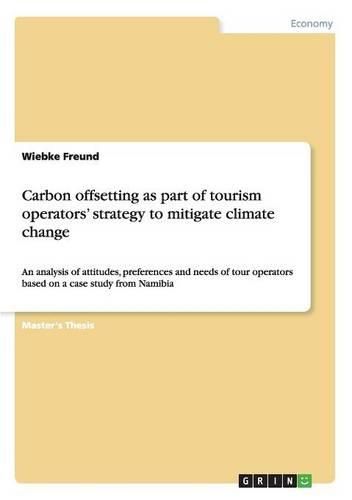Readings Newsletter
Become a Readings Member to make your shopping experience even easier.
Sign in or sign up for free!
You’re not far away from qualifying for FREE standard shipping within Australia
You’ve qualified for FREE standard shipping within Australia
The cart is loading…






Master’s Thesis from the year 2012 in the subject Tourism, grade: -, The University of Applied Sciences in Eberswalde (Nachhaltiges Tourismusmanagement), course: Nachhaltiger Tourismus, language: English, abstract: This study is undertaken with the background that tourism is an active contributor to the man-made climate change and is also vulnerable to impacts of climate change. Apart from climate adaptation measures, the tourism industry needs to develop mitigation strategies to reduce its greenhouse gas emissions. Tour operators play the key role in climate protection measures in the tourism industry but may also face significant challenges due to climate change. This paper focuses on carbon offsetting as one tool of tour operators’ climate protection activities. Besides a literature analysis, empirical data was collected through qualitative interviews for this study. Two different surveys were undertaken: one with international tour operators that are already active in climate protection and one with tour operators in Namibia. The interviewed companies all used carbon offsetting by either managing an own project to compensate emissions or by cooperating with an offsetting agency. The choice seemed to be founded in each company’s capacity and resources as well as in their basic philosophy. Forestry projects as self-managed offsetting projects were clearly preferred. It was identified that pivotal factors for choosing forestry projects were accessibility for travel groups, tangibility for communication purposes and social benefits for local communities. Several companies indicated growing customer satisfaction or believed their climate commitment would positively influence their bookings. These outcomes were independently of the type of offsetting project the tour operators supported. The study further revealed that general factors for success in climate mitigation are not related to the size of a company, but rather its general commitment to sustainability, a stra
$9.00 standard shipping within Australia
FREE standard shipping within Australia for orders over $100.00
Express & International shipping calculated at checkout
Master’s Thesis from the year 2012 in the subject Tourism, grade: -, The University of Applied Sciences in Eberswalde (Nachhaltiges Tourismusmanagement), course: Nachhaltiger Tourismus, language: English, abstract: This study is undertaken with the background that tourism is an active contributor to the man-made climate change and is also vulnerable to impacts of climate change. Apart from climate adaptation measures, the tourism industry needs to develop mitigation strategies to reduce its greenhouse gas emissions. Tour operators play the key role in climate protection measures in the tourism industry but may also face significant challenges due to climate change. This paper focuses on carbon offsetting as one tool of tour operators’ climate protection activities. Besides a literature analysis, empirical data was collected through qualitative interviews for this study. Two different surveys were undertaken: one with international tour operators that are already active in climate protection and one with tour operators in Namibia. The interviewed companies all used carbon offsetting by either managing an own project to compensate emissions or by cooperating with an offsetting agency. The choice seemed to be founded in each company’s capacity and resources as well as in their basic philosophy. Forestry projects as self-managed offsetting projects were clearly preferred. It was identified that pivotal factors for choosing forestry projects were accessibility for travel groups, tangibility for communication purposes and social benefits for local communities. Several companies indicated growing customer satisfaction or believed their climate commitment would positively influence their bookings. These outcomes were independently of the type of offsetting project the tour operators supported. The study further revealed that general factors for success in climate mitigation are not related to the size of a company, but rather its general commitment to sustainability, a stra